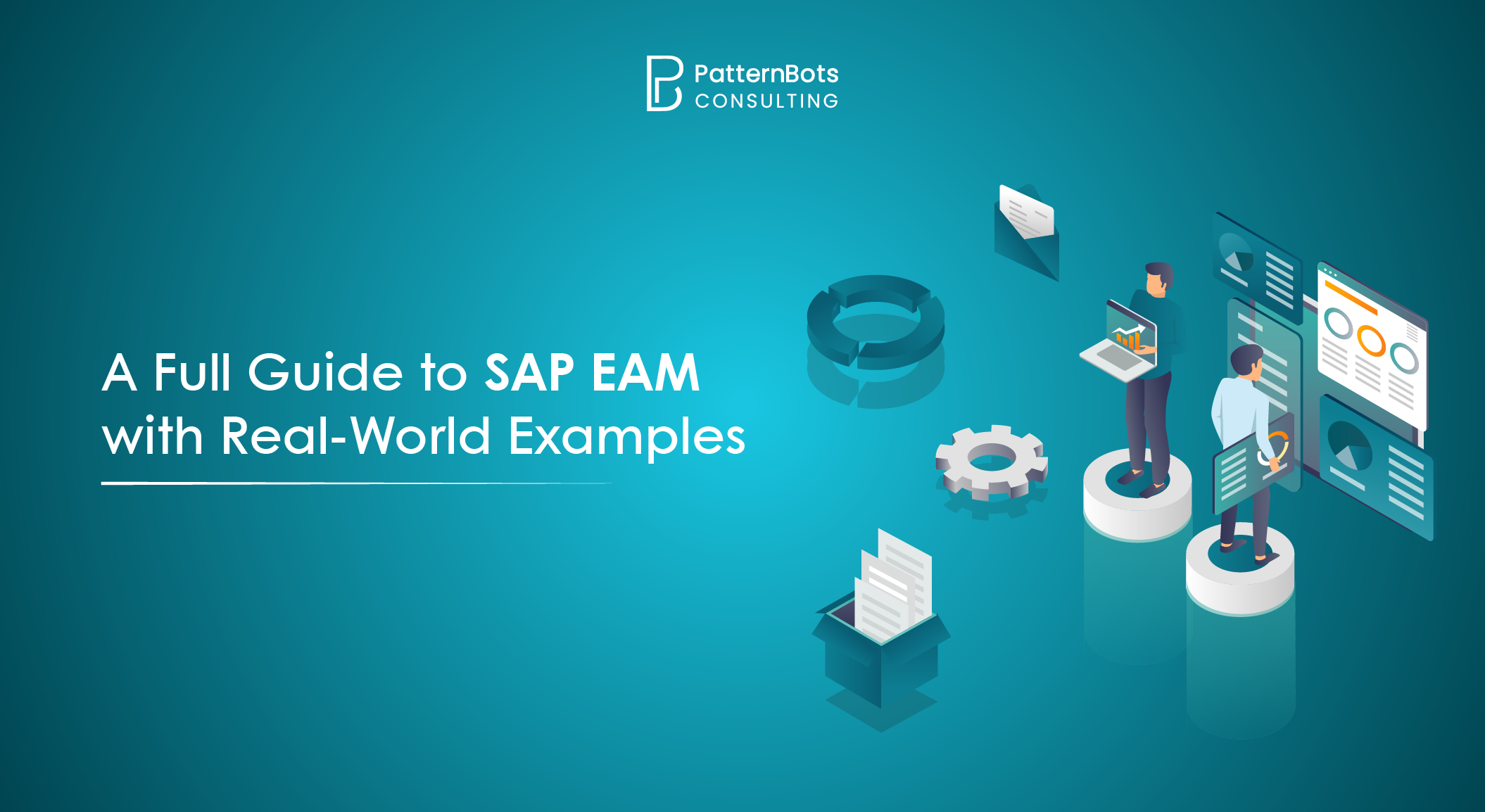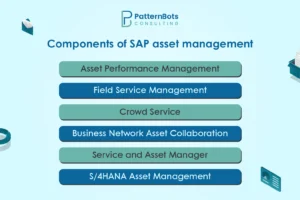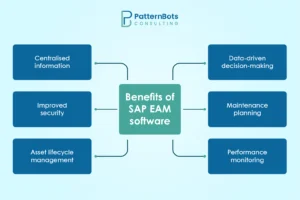
- Posted on
- Bhanu Pratap
- What is SAP EAM
- How SAP Enterprise Asset Management Works
- Components of SAP asset management
- Benefits of SAP EAM software
- Real-life application of SAP EAM solution
- How PatternBots can help you
What is SAP EAM?
SAP Enterprise Asset Management is software that manages and maintains the company’s physical assets and integrates the business processes and network to track and manage asset performance effectively. With SAP asset performance management, businesses can use AI-enabled predictive maintenance tools, GIS (geographic information systems), and IoT (Internet of Things) sensors to improve the asset information storage capacities and centralise all this data to different business locations.How SAP Enterprise Asset Management Works
By using on-premises and cloud-based infrastructure, SAP EAM solutions manage the business’s assets systematically and get real-time information across different business locations. Here are the key functions of SAP lifecycle management:1. Asset data collection
With SAP’s asset lifecycle management software, you can easily collect valuable data related to assets and store it in a centralised repository. Businesses can also use this data to assess asset performance and improve their accessibility & visibility to ensure better performance in the long run.2. Risk assessment and asset-guiding strategies
The risk assessment process becomes easy since SAP asset management solutions integrate with machine learning tools and advanced predictive analytics. It ensures that asset management processes are maintained effectively and unplanned maintenance can be replaced with scheduled preventive maintenance procedures.3. Schedule maintenance operations
With asset lifecycle management software, you can easily schedule, manage, and perform maintenance procedures while controlling the SAP asset strategy in a streamlined way. SAP EAM also helps prioritise the asset inspection and maintenance processes so that important assets are managed effectively, and all the issues related to such assets are minimised.Components of SAP asset management
 These are some components of SAP enterprise asset management which you can use for your business:
These are some components of SAP enterprise asset management which you can use for your business:
1. SAP Asset Performance Management
The SAP APM helps businesses identify and evaluate asset-related risks. This improves the team’s productivity, as equipment failure curves are easily determined with pre-calculated probabilities.2. SAP Field Service Management
The SAP FSM integrates artificial intelligence features with other workforce scheduling procedures to plan and manage workforces effectively. This allows businesses to easily manage their work data and asset information and leverage customised reports for decision-making.3. SAP Crowd Service
SAP Crowd Services offers professional services to businesses through its collaborative system, which maintains a strong network of service professionals. It also provides AI-enabled scheduling to ensure that dispatch technicians can efficiently complete service requests throughout the asset lifecycle.4. SAP Business Network Asset Collaboration
Suppose you need a single platform to find and manage assets to create a strong foundation for your business’s suppliers, operators, and service providers. In that case, SAP Business Network Asset Collaboration can help you with that. With better networking and collaboration, your business can drive better outcomes in the long run.5. SAP Service and Asset Manager
With SAP Service and Asset Manager, businesses efficiently manage work orders using mobile device integration to access information and manage everyday tasks. This way, leveraging existing asset data, whether online or offline, becomes more manageable.6. SAP S/4HANA Asset Management
Using SAP S/4HANA, businesses can easily create schedules, monitor work statuses, and track time-sensitive tasks related to asset maintenance processes.Benefits of SAP EAM software
 SAP EAM solutions help a business in many ways. Here are some advantages that your company can also have with the SAP enterprise asset management system:
SAP EAM solutions help a business in many ways. Here are some advantages that your company can also have with the SAP enterprise asset management system:
1. Asset lifecycle management
With SAP EAM, businesses get complete support for asset lifecycle management. From acquisition to installation, operation, and maintenance, you can track every aspect related to asset management.2. Improved security
SAP EAM helps businesses identify outcomes and improvement areas in assets so that minor issues can be resolved before they turn into major problems related to employees’ safety. Such maintenance compliance also complies with the regulatory requirements, minimising businesses’ liability.3. Centralised information
Since SAP Lifecycle Management incorporates all asset information in a single place, it improves the visibility and accessibility of all users. With such integrated information, users can easily monitor performance, manage asset data, and schedule maintenance processes.4. Data-driven decision-making
By replacing paper-based manual reporting, SAP EAM uses real-time data to make maintenance processes more efficient and ensure data-driven decisions. These decisions help improve business performance through better planning.5. Performance monitoring
With advanced analytics capabilities, SAP EAM ensures live performance monitoring and identifies real-time issues. Data is monitored using multiple sources, such as IoT devices, equipment interfaces, and sensors, to provide actionable insights about asset health and potential failures.6. Maintenance planning
With preventative maintenance scheduling and resource allocation features, SAP EAM helps businesses optimise their asset management processes. This allows companies to quickly minimise downtime and improve decision-making related to asset maintenance.Real-life application of SAP EAM solution
SAP EAM solutions are used in different business sectors and industries. Here are some real-life examples of how various business sectors use SAP EAM:-
Healthcare industry
-
Manufacturing industry
-
Oil and water industry
-
Chemical and petroleum industry
-
Agriculture industry
How PatternBots can help you with your company’s asset lifecycle management
Whether you need assistance with asset lifecycle management or SAP EAM solutions, PatternBots can help you with everything. Our expert team of SAP consultants has 15+ years of experience in SAP project management and SAP EAM, making asset management procedures easier with our specialist consultancy services. Work with us to simplify your asset lifecycle management while saving time and cost.Frequently Asked Questions
1. What is SAP Enterprise Asset Management (SAP EAM), and how does it work?
SAP Enterprise Asset Management (SAP EAM) is a software solution that helps companies manage their assets for increased efficiency and maximum lifetime.
2. How does SAP EAM support asset lifecycle management?
SAP EAM supports and increases asset lifecycles by ensuring proper asset data collection, performing risk assessment, and streamlining the scheduling of maintenance activities. This improves asset performance and reduces asset downtime.
3. What are the key benefits of using SAP Asset Performance Management (SAP APM)?
Businesses using SAP Asset Performance Management achieve better decision-making, enhanced productivity, operational efficiency, and a more effective asset lifecycle.
4. How does SAP Field Service Management integrate with SAP EAM?
SAP Field Service Management integrates with SAP EAM by enabling data exchange and integrating the asset management processes. This way, businesses get real-time updates related to work order management.